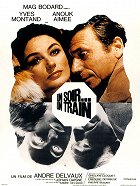Ohjaus:
André DelvauxKäsikirjoitus:
André DelvauxKuvaus:
Ghislain CloquetSävellys:
Frédéric DevreeseNäyttelijät:
Yves Montand, Anouk Aimée, Adriana Bogdan, Michael Gough, Catherine Dejardin, Patrick Conrad, Frédéric Devreese, François Beukelaers (lisää)Arvostelut (1)
An academic art film about an academic that is as closed off as its main character. A film about a self-centered man (his self-isolation is already shown to us in the opening lecture, where he refuses the idea of the subject of his interest to come into interdisciplinary contact with other sciences) and no one else. The other characters simply do not exist. If it were not for the contrived beginning with an abundance of unnecessarily drawn-out, universally philosophizing, and variously distorted musings about death, angels, and language, the viewer would not understand this. We simply need to go back to the theater rehearsal scene, where everything is explained to us through the character from the medieval play "Elckerlijc," where it is clearly stated that "the entire play is a monologue," that Elckerlijc's entire conversation with Death is actually a conversation with oneself (be careful if you watch the film with English subtitles, where "entre le soi et le moi" is nonsensically translated as "between the self and the not-self," which is simply horribly translated). The entire film, from the conversations with Anne, the travels of the trio of academics (who are of course nothing more than the main character himself, yesterday, today, and tomorrow, and not autonomous characters) to all the other scenes (for example, in the cemetery - it is difficult to find one's own grave...) takes place within the immanence of the main/only character. It is then not difficult to surmise that Anne is the personification of Death (cinematically, this is beautifully subtly demonstrated when Montand speaks the crucial words about the division of Elckerlijc within himself and about Death, and Anouk Aimée slowly moves to the background of the shot), and that the main character must end up the same as Elckerlijc, alone.
()
